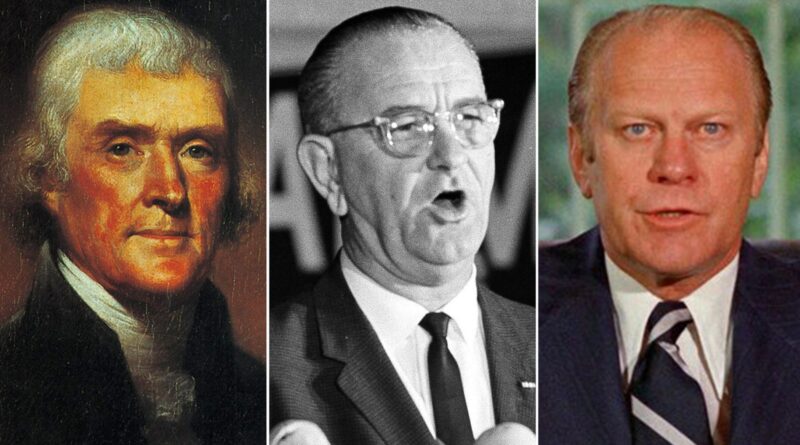Former vice presidents who served one term or less before becoming president | US News
If Kamala Harris wins on 5 November, she will be the third US vice president in history to become president after a single term.
Thomas Jefferson and Martin Van Buren both assumed the presidency after serving as vice president for a term. Lyndon B. Johnson, Harry Truman, and Theodore Roosevelt, among others, became president due to the death of their predecessor, while Gerald Ford took over after Richard Nixon’s resignation.
Let’s take a look back at the vice presidents who replaced their bosses after one term or less.
Thomas Jefferson
Jefferson was the second vice president of the United States.
Having started as a planter in Virginia and then transitioning to a career in law, he entered politics in the 1770s.
At the age of 33 in 1776, while serving as a delegate for Virginia, he drafted the Declaration of Independence, establishing himself as a founding father.
He co-founded the Democrat-Republican Party with James Madison in the early 1790s and later served as governor of Virginia before joining George Washington’s cabinet.
Jefferson served as US minister to France and then as the first secretary of state, resigning in 1793 due to tensions over his views on the French Revolution.
Read more
The VP debate could swing the election
Analysis: Harris’s bid for the White House is serious
How did Trump’s claims that immigrants eat pets start?
Jefferson became vice president under the old rules where the candidate with the second largest number of votes would assume the role. He served as Adams’s vice president from 1797 to 1800, despite being Adams’s political rival.
It was the tie with Aaron Burr that led to the creation of a separate vote for vice president in the 12th Amendment of the Constitution in 1804.
Jefferson served two terms as president, known for promoting freedom of speech, religious freedoms, and acquiring Louisiana from the French. Although a slaveowner, he remained entrenched in the system.
Martin Van Buren
Van Buren was a founding member of the Democratic Party and was elected as the eighth vice president by Andrew Jackson in 1832.
Prior to this, he had a successful legal career in New York, rising to the office of attorney general before becoming a senator and briefly governor.
He was a close adviser to Jackson, who appointed him as secretary of state and then minister to Great Britain before nominating him as vice president.
Known as the “Little Magician” due to his height of 5ft 6in, Van Buren became president in 1836 after Jackson decided against a second term.
His tenure was marked by the Panic of 1837, which led to an economic depression lasting five years. Van Buren focused on maintaining government solvency during this period.
Defeated by the Whigs in the 1840 election, Van Buren remained influential within the anti-slavery movement.
He unsuccessfully sought the Democratic nomination in 1844 and ran as the Free Soil Party candidate in 1848.
Gerald Ford
Ford is the only person in US history to have served as both president and vice president without winning an election.
He assumed the vice presidency via the 25th Amendment in October 1973 after Spiro Agnew resigned following a plea of no contest to tax evasion.
Before this, Ford spent 25 years in Congress, starting as a Michigan Representative and eventually becoming House minority leader. He briefly attempted to become House Speaker before Agnew’s resignation.
However, a year into his vice presidency, the Watergate scandal and Richard Nixon’s impending impeachment trial led to Ford assuming the presidency in October 1974.
Facing economic challenges and international issues, Ford’s presidency saw various struggles, culminating in his loss to Jimmy Carter in the 1976 election.
Lyndon B. Johnson
John F. Kennedy chose Senate majority leader and Texan Democrat Lyndon B. Johnson as his running mate in the 1960 election.
Considered to have had little influence as vice president, that changed when JFK was assassinated in 1963.
Johnson was sworn in as president on the same day of Kennedy’s assassination, going on to win the 1964 election by the largest popular vote share since the 1820s.
His presidency saw significant advancements in civil rights and social programs, while his handling of the Vietnam War was heavily criticized.
Deciding not to run for re-election, Johnson left office in 1969.
Andrew Johnson
Andrew Johnson became president in the midst of the American Civil War after Abraham Lincoln’s assassination in 1865.
While he was praised in the north for his commitment to the Union, his failure to secure the rights of former slaves in the south led to criticism.
Impeachment proceedings were initiated against Johnson by radical Republicans, but he narrowly escaped removal from office.
After leaving the presidency, Johnson returned to the Senate briefly before his death in 1875.
Harry Truman
Harry Truman became president after Franklin D. Roosevelt’s death during World War II in 1945.
Known for dropping atomic bombs on Japan to end the war, Truman also confronted the Soviet Union and communist China during the Cold War.
His decisions during the Korean War led to his unpopularity with the public, resulting in his decision not to seek another term as president.
Theodore Roosevelt
- UN Extends Haiti Mission for an Additional Year Following Cancellation of Peacekeeping Efforts
- Bloc Québécois to advocate for pension agreement with opposition parties through motion on Opposition Day







 Source link
Source link

